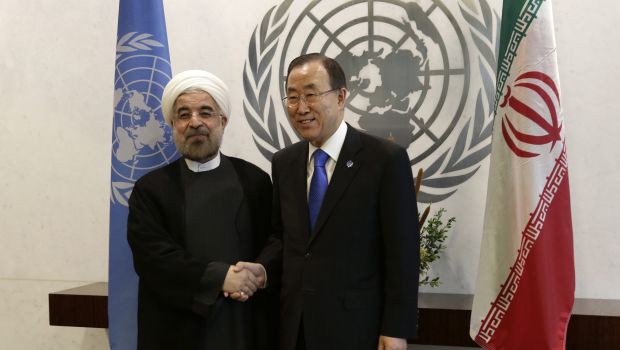
Hassan Rouhani, President of Iran (L), arrives for his meeting with United Nations Secretary-General Ban Ki-moon during the 68th session of the United Nations General Assembly at the United Nations headquarters in New York on September 26, 2013. (EPA/JASON SZENES)
These sentiments were given official voice at the UN General Assembly on Tuesday when Rouhani publicly reiterated the promises that had carried him to the Iranian presidency before the world’s premier international forum. His overall message was clear: Iran, he declared, “poses absolutely no threat to the world.” Nuclear weapons had “no place in Iran’s security and defence doctrine” and, in fact, contradicted the nation’s “fundamental religious and ethical convictions.”
Pleasing words, though arguably vapid—and it is important to note that they represent no change in Iran’s official position, which has always been an outright denial of any nuclear weapons ambitions. More meaningful was his statement that the country’s “national interests” made it imperative to “remove any and all reasonable concerns about Iran’s peaceful nuclear program.”
His speech came just hours after Barack Obama expressed his own desire to reach a meaningful agreement with Iran through a “diplomatic path” between the two countries. Critically, from an Iranian point of view, Obama acknowledged what he described as Washington’s “past mistakes” toward Iran—a statement that went down well in the Iranian press, with positive write-ups of his speech in both the moderate Donya-e-Eqtesad as well as the conservative Jomhouri Eslami newspapers.
Despite the goodwill on show the two sides remain far apart. There have been no official relations between Iran and the US for over thirty years and the hoped-for meeting between Obama and Rouhani, (at a lunch organized by UN leader Ban Ki-moon), which would have been truly significant, did not occur. It was, US diplomats said, “too complicated” for the Iranian side.
Both Obama and Rouhani still cling to their respective positions. Iran refuses to compromise over its uranium enrichment program (which it describes as an “inalienable right”) and Rouhani described sanctions designed to target it as “violent, pure and simple.” Obama meanwhile, was not about to back down from voicing perennial US concerns about the possible weaponization of Iran’s nuclear activities.
Rouhani was undoubtedly offering an olive branch, but his rhetoric was couched, at times, in the strongest of terms. It was, for example, only possible for the two countries to “arrive at a framework to manage our differences” if President Obama ignored “the short-sighted interest of warmongering pressure groups.”
But the positives were there for all to see, and the speech can best be seen as the culmination, or most overt expression of the “constructive interaction” with the world, specifically the West, that Rouhani has being calling for.
Also promising were his pointed attempts to distance himself from the malignant rhetoric and Holocaust denial of Ahmadinejad. In an interview with CNN later in the day Rouhani described the Holocaust—quite rightly—as a “reprehensible” Nazi crime against the Jewish people. In itself, it wasn’t an especially noteworthy comment—in fact, it was the only sensible thing he could say (though Iran’s Fars News Agency later denied he had used the word “Holocaust.”) But it is yet another small signal: a desire to let the world know that he brings with him a new attitude towards international relations. One perhaps grounded more in reality than in the desire to offend and alienate in the name of a spurious idea of “defiance” that drove Ahmadinejad’s foreign policy.
His speech did not please everyone. Israeli Prime Minister, Benjamin Netanyahu, described Rouhani’s professed desire for peace as “hypocritical,” citing—justly—Iran’s support of Bashar Al-Assad’s massacre of civilians in Syria. He also noted that Rouhani has offered nothing new toward resolving the nuclear crisis—also true.
But the speech must ultimately be considered within the framework of the overarching relationship between Iran and the West, in particular between Iran and the US. It is this relationship that must be fixed before the nuclear crisis can be solved. The speech was not groundbreaking, but it is a start. And it is—critically—a vast improvement on what Iran previously offered the world: namely, Ahmadinejad.
Any solution to the crisis will not come from a single “grand bargain” between Iran and the P5+1 or even the US. As Obama himself noted, the suspicion between the two sides “runs too deep.” Small steps must come first. Interim agreements or bargains, possibly involving Iran shipping out a percentage of its Low Enriched Uranium in return for a corresponding amount of nuclear fuel is the path most likely to bring success in the short-term. In return, Iran might receive sanctions relief and other desired ‘carrots.’ Once any such agreement was reached, negotiations on the wider issues could follow.
For diplomacy to work the sides must first be able to talk. Rouhani is not an ideal Iranian president by any means—he is a cleric absolutely loyal to the Islamic Republic, and he is certainly no reformer. But he is the best we can hope for right now, and the opportunity to engage with him must not be missed.
This article was originally published in The Majalla.
All views expressed in this blog post are those of the author(s) and do not necessarily represent the views of, and should not be attributed to, Asharq Al-Awsat or The Majalla Magazine.
